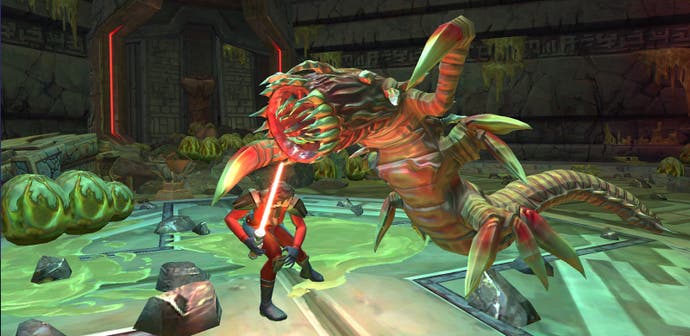Steam vs. Origin: Is Competition Good for Gamers?
EA, GOG, Gamersgate, Gabe Newell weigh in.
"There are different strengths that people bring to the party. We understand our consumers in our games best. A traditional retailer, depending on what space it's in, if it's just games or it's games and music and movies, they have a broader consumer portfolio, so they understand people in many more categories a little less deep. We understand our people in our category very deep.
"So it should be a nice and innovation-stimulating competition out there, which at the end is good for the consumer."
Perhaps unsurprisingly, not everyone shares that view. Good Old Games, which happily ploughs its own niche as a provider of classic retro titles, reckons that you, the customer, will be the biggest loser if the market continues to break up.
"If in the long run all the big publishers are going to follow EA's strategy I think the market will become very complex and become a big puzzle for the consumer," explained CEO Guillaume Rambourg.
"The gamer is like any other consumer - like you or me going to the supermarket to buy food, for example. If in the future you had 50 shops - one to buy vegetables, one to buy fruit, one to buy pasta, one to buy coffee, we would all go crazy. We have to keep the market and the offers simple for consumers.
"And to go further, we have to keep consumers happy - this should be the bottom line for the industry, the obsession of the industry. Are the consumers going to be happy if there are 50 different places to buy 50 different products? I don't think so to be honest."
So, how big a threat does Origin pose to the established order? Well, while it's undoubtedly a thorn in Valve's side, it's unlikely to be able to offer the same breadth of content as Steam, despite EA's claim that it hopes to lure third parties onto the platform. While, at a stretch, a few second tier publishers might be willing to hand over control of their IP to a competitor in return for added visibility, you can bet Bobby Kotick would sooner offer up his first born.

However, Divnich reckons a publisher of EA's stature has enough original content and a high enough profile to run a profitable ecosystem.
"It may be fair to say that this is a Wal-Mart versus mall scenario, where consumers who just want a simple one-stop-shop experience typically prefer the Wal-Marts and Targets of the world, and those looking for specialty items or prefer bargain hunting will spend the time jumping from one mall store to the next."
Further market splintering is likely as the switch away from boxed product gathers pace, especially if/when consoles ditch discs and go download-only too. And it's not just major publishers that Valve needs to worry about. Indies - who've played a big part in the Steam success story - are at it too. Did Notch need Steam's help to make Minecraft one of the most profitable games of all time? Nope.
Sure, your average indie needs the exposure that Steam's frontpage can offer, but increasingly it's their own sites that are providing Valve with stiff competition, rather than alternative online stores. Schaefer tells us that although Steam accounted for 65 per cent of all Torchlight sales, the second biggest contributor was the Runic Games site.
The other wolf that Steam needs to keep from its doors is piracy. That's another article for another day, but as long as Ubisoft and its ilk insist on invasive, customer-baiting DRM in their downloads, it's a threat that isn't going to go away.

And what is Valve's take on all this hoopla? Typically, it's taking the high ground, ignoring the scrapping going on in its wake and, like GOG's Rambourg suggests, keeping its focus on what has put it in the enviable position it sits in today: its customers.
"We've never really found it helpful to us to set up somebody else as a competitor and then try to evaluate ourselves against that," company president Gabe Newell told Eurogamer at Gamescom earlier this month.
"Sometimes if feels like you're constraining yourself to the mistakes and good decisions of other people rather than just focusing on customers and what you should be doing for them. So we don't often find it really helpful to sit down and say, well, these guys are our competitor and they're doing this so we should do this.
"There are a lot of companies that, if you identify yourself as a competitor to them, you're going to follow them right into the ground. It's like, oh, they're doing this, let's do this, too. Arggh! What happened to the music genre? We have a billion dollars in plastic. Yay! Customers are a lot more helpful than competitors in making good decisions."
While Steam might not have the market all to itself any more, with that attitude, PC gamers can only hope it continues to be a leader, rather than a follower, for years to come.








